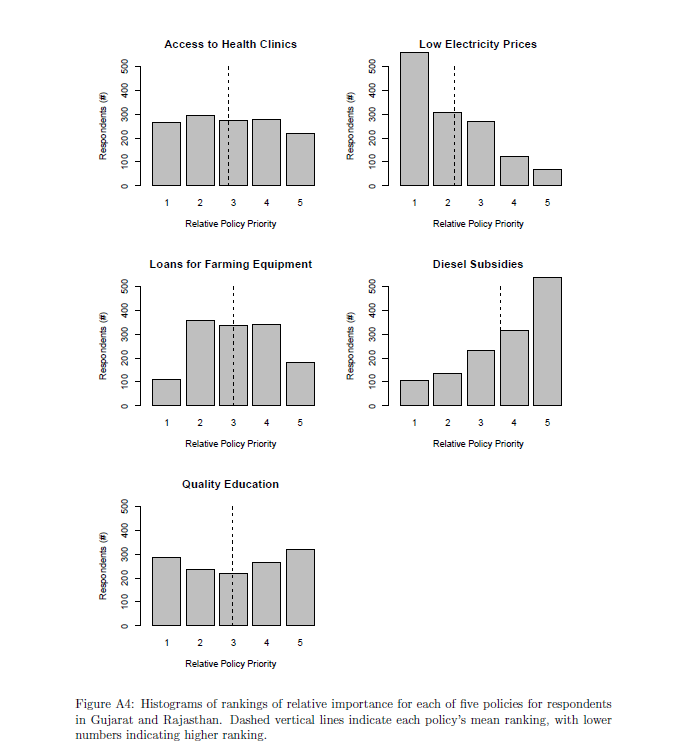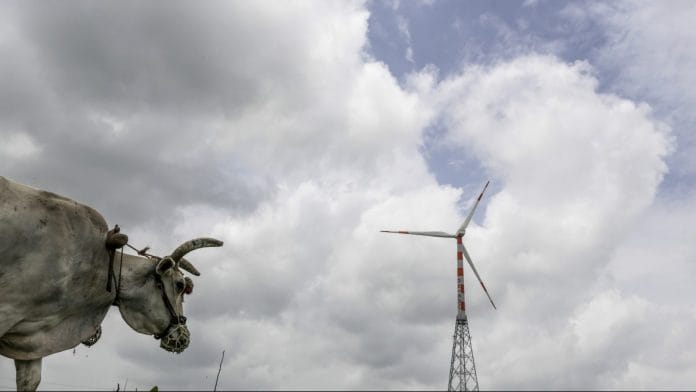In a low trust and low capacity state, voters can resist reform, because they believe the government is either unwilling or incapable of implementing it successfully and equitably.
What determines support for political reform of subsidies and other putatively pro-poor social policies that are mired in a bad equilibrium? In particular, what explains citizens’ opposition to reform when the existing policies could be replaced with alternatives that would leave them better off? While the material incentives of vested interests are important sources of opposition to some reforms, they cannot explain the persistence of policies that have negative or clearly sub-optimal effects for most beneficiaries.
We approach these questions in the context of the preferences of Indian farmers over electricity pricing and diesel subsidies. Because India’s agriculture is heavily dependent on groundwater for irrigation, the cost of electricity and diesel – the two fuels used to pump groundwater – is a critical ballot-box issue for farmers. Electrified pumps are much more efficient than diesel pumps, and a rational irrigation policy would encourage farmers to use electrified pumps with electricity prices that both cover the cost of power generation and discourage excessive groundwater pumping. In practice, however, state governments provide farmers with diesel subsidies and an electricity supply that is heavily subsidized but unreliable.
Subsidies have poverty-perpetuating effects in the short term, because they make the provision of reliable electricity unprofitable, and in the medium-term, because they lead to unsustainable use of groundwater, further impoverishing farmers. Conditions of scarcity likely shorten farmers’ time horizons and make medium-term considerations less important; these short time horizons can likely explain why reforms requiring intertemporal trade-offs face opposition.
However, it remains a puzzle why farmers would fail to support reforms that would make their energy access more reliable and immediately improve agricultural productivity and livelihoods. Understanding the political economy of a bad policy equilibrium, and of successful reform, requires a resolution to this puzzle.
Given that India’s democratic political system has contributed to the growing political power of agricultural interests over time, and that farmer mobilization is a key obstacle to subsidy reform, the Indian context is ideal for assessing the role of public opinion in energy subsidy reform. Given the importance of energy subsidies and the electoral power of beneficiaries, election-oriented politicians face tremendous difficulties in reforming these policies.
Our primary argument is that trust in government is an essential condition for supporting policy reform. Here we define trust in government as a belief in politicians’ sincere willingness and ability to fulfill their promises. A move from diesel and electricity subsidies to a more efficient policy requires, first and foremost, that farmers trust their governments’ (both state and central) sincerity and ability to carry through on the full program of promised reform.
To test the hypothesis, we conducted a survey of 2,010 farmers in three states of India: Bihar, Gujarat, and Rajasthan. The primary outcome variables are survey questions about the roles that subsidies played in farmer’s decisions about which politicians to vote for in recent elections. We measure the importance farmers ascribe to diesel subsidies and electricity pricing in their voting decisions. Diesel subsidies measure acceptance of the status quo energy regime, whereas electricity pricing measures interest in reforms.
The most important finding is that trust in government consistently predicts farmers’ policy preferences for diesel and electricity policy in elections. In particular, trust in the central government is a critical pre-condition for interest in electricity pricing policies. Farmers who trust the central government are more likely to be in favour of electricity reforms, suggesting that farmers believe that the central government is in a good position to enact reforms, despite the important role that state governments play in energy policy formulation. This finding from our surveys dovetails with our field research, which suggested that skepticism about the government’s intentions or capabilities – usually because of frustration from past campaign promises – made farmers unreceptive to potential reforms.
We also demonstrate that these subsidies are important to farmers: survey respondents in Gujarat and Rajasthan were asked to prioritize different policies, explicitly forcing them to make a trade-off. These farmers ranked electricity prices as the top policy issue, even above healthcare and education. (See graph below)
This provides further evidence of the electoral relevance of farmers’ subsidy preferences and shows why any successful reform of the status quo requires the buy-in of these vested interests.

These results advance the study of public opinion about subsidy policies and obstacles to reforming them, and by extension, to the reform of other social policies. Our findings provide evidence that lack of trust in government is a key obstacle to policy reform. A unique feature of our study is that we focus on, and actually survey, so-called ‘vested’ interests – farmers with a direct stake in outcomes.
In this regard, we go well beyond conventional surveys focused on attitudes towards subsidies and social policies by specifically researching the attitudes of the population that would be most affected by possible reform.
Subsidy preferences’ effect on voting is particularly important from a political economy of development perspective, because it is the combination of electoral incentives for politicians and low 5 political trust among the public which contributes to the (status quo) unsustainable and poverty perpetuating equilibrium. While studies document that Indian politicians face electoral pressures to maintain subsidies, fewer focus on understanding the source of public opposition to policy reform, and among those that do, the focus is on the broader sources of support and opposition in the general population. Our focus on farmers is critical in India, since it is exactly this large and electorally powerful group who are necessary to convince in order for politicians to successfully advocate reform and for the current ‘vicious cycle’ to be broken.
We build on this finding to show that in a low trust and low capacity state, voters can resist reform even when it is in their interest, because they believe that the government is either unwilling or incapable of implementing the reform successfully and equitably. The lack of trust in politicians who propose potentially welfare-improving reforms ensures that these policies are not enacted, perpetuating an unequal and inefficient status quo.
This edited extract has been republished with permission from the study titled “Trust in Government and Subsidy Reform: Evidence from a Survey of Indian Farmers”. The March 2018 study was conducted by the Initiative for Sustainable Energy Policy (ISEP), Johns Hopkins School of Advanced International Study. Meir Alkon and Johannes Urpelainen are with Princeton University and Johns Hopkins SAIS.
You can view the full report here.






